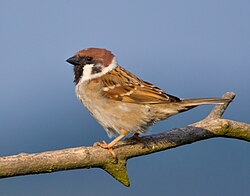Four pests campaign

The Four Pests Campaign (Chinese: 除四害; pinyin: Chú Sì Hài) was one of the campaigns of China, against four pests: namely rats, flies, mosquitoes and sparrows. It was part of a campaign called the Great Leap Forward, which wanted to boost Chinese economy, in the mid-20th century. The campaign started in 1958.
The extermination of sparrows is also known as Smash Sparrows Campaign (Chinese: 打麻雀运动; pinyin: Dǎ Máquè Yùndòng) or Eliminate Sparrows Campaign (Chinese: 消灭麻雀运动; pinyin: Xiāomiè Máquè Yùndòng). It caused severe ecological imbalance; it was one of the causes of the Great Chinese Famine.
Mao had been told that sparrows ate grain (amongst other things), which was true. But they also ate locusts. And locusts ate nothing but grain. The cause of the famine which followed was that, without sparrows, locusts multiplied hugely and ate so much grain that a great famine followed in China.
In 1960. Mao Zedong ended the campaign against sparrows and redirected the fourth focus to bed bugs. Only after Mao died, in 1976, did the official Chinese press agency announce that sparrows were more useful than harmful.[1][2][3][4] The government took measures to increase the sparrow population in the province of Shandong.
Four Pests Campaign Media
References
- ↑ Nowak, Eugeniusz (2002). "Erinnerungen an Ornithologen, die ich kannte (4. Teil)" (PDF). Der Ornithologische Beobachter (in Deutsch). 99: 49–70. Archived from the original (PDF) on 2018-02-22. Retrieved 2018-02-22.
- ↑ Shapiro, Judith Rae (2001). Mao's War Against Nature: Politics and the Environment in Revolutionary China. Cambridge University Press. ISBN 0-521-78680-0.
- ↑ McCarthy, Michael (2 August 2006). The secret life of sparrows. https://www.independent.co.uk/environment/the-secret-life-of-sparrows-410252.html. Retrieved 30 January 2009.
- ↑ Summers-Smith, J. Denis (1992). In Search of Sparrows. London: Poyser. pp. 122–124. ISBN 0-85661-073-9.

